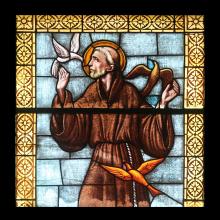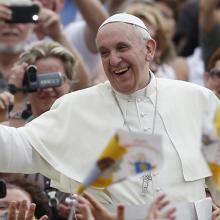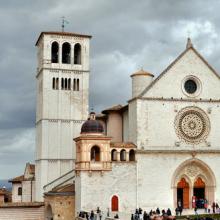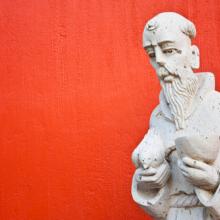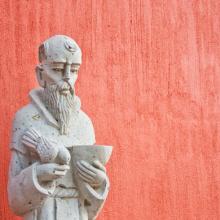St. Francis of Assisi
RICH MULLINS HAD a museum of a personality. The singer-songwriter, who died in a car accident in 1997, loved to show off anything he found interesting, his friends say. From music to movies to the places he traveled, Mullins loved “for you to experience what he loved,” his friend and collaborator Mitch McVicker told Sojourners.And more than just about anything else, Mullins loved Jesus.
Mullins’ career tracked alongside the evolution of contemporary Christian music (CCM), which went from marginal in the 1970s to a powerhouse genre that sold a combined 31 million albums in 1996. Best known for the modern hymn “Awesome God,” Mullins wrote his fair share of songs that fit Christian radio. But more often, his music was a kaleidoscope of faith and humanity, offering a tour of human frustration and failure.
On “Hard to Get,” Mullins, as modern psalmist, asks God, “Do you remember when you lived down here, where we all scrape to find the faith to ask for daily bread? / Did you forget about us, after you had flown away?”
In other places, Mullins plays minor prophet. “I wrote this for the Religious Right,” he declared before singing that Jesus “came without an axe to grind [and] did not toe the party line,” during a performance of “You Did Not Have a Home.”

By Simone Martini - The Yorck Project: 10.000 Meisterwerke der Malerei. DVD-ROM, 2002. ISBN 3936122202. Distributed by DIRECTMEDIA Publishing GmbH., Public Domain
St. Clare and the women religious who formed my faith taught me that there are as many ways to be a faithful woman as there are women on the earth. They taught me that you can serve God while being strong, outspoken, and good at what you do. Even more significantly, they taught me the importance of sharing stories about the many and varied ways that women serve God and their fellow humans.
Every year on Oct. 4 a strange thing happens outside of an ecumenical list of churches around the globe. As if each church were reenacting Noah’s Ark, a bevy of animals and their human counterparts congregate just outside the doors for a ceremonial Blessing of the Animals to commemorate the feast day of Francis of Assisi. The sight of horses, dogs, cats, birds, snakes, and pot-bellied pigs jockeying for position could be called disarmingly odd to a first timer or refreshingly quaint to the already initiated. As a follower of St. Francis myself, I would label the spectacle as revolutionary in a small way that continues to subtly permeate Christian culture to this day. Rather than celebrate the quirkiness of the ritual itself, I would like to speak to St. Francis as an icon for justice whose way of organizing and advocacy is not only rooted in Christianity, but may just provide the necessary strategy for handling a major justice issue of our time: Do all God’s creatures have a place in God’s house?
From the day Christ spoke through a cross at San Damiano Church, “Francis, go repair my household, which you see has fallen into ruin,” Francis of Assisi was called to restore God’s household. This call echoes the prophet Isaiah who called young people to restorative justice as “repairers of the breach and restorers of ruined dwellings” (Is 58:12). Scripture tells us that God’s household has many dwelling places (John 14:2): our worship spaces are contained in houses (Rom 16:5), our bodies are temples of God (1 Cor 6:19), even the Earth itself is a house within God’s household (2 Cor 5:1). The revolutionary thing that Francis appreciated about God’s household was the significance of the incarnation: Everything came to be through the Word of God (John 1:10) and the Word itself became Jesus Christ. By virtue of Creation, everything is related to Christ and a mirror to God.
Moved by the election of Pope Francis seven months ago, the name “Francesco” has leapfrogged to No. 1 on the list of the most popular baby names in Italy, according to a study.
The study, conducted by Enzo Caffarelli, who researches the origins of names at Rome’s Tor Vergata University, along with telephone directory publisher Seat PG Italia, also showed a trend toward re-naming streets, town squares, and parks for St. Francis of Assisi, the pontiff’s namesake.
Ancient stones, steep stairs, and sparkling fresh air greeted me upon arrival in Assisi, Italy, a month ago. Lush olive groves, leaves iridescent in the sun, offset the city stones. “What sort of place is this, that shaped St. Francis 800 years ago?” I asked myself. Eager to deepen my understanding of the saint, I had returned to Assisi to walk in the footsteps of St. Francis.
Profligate playboy, drama king, dejected knight, young Francis lived life large. He grew up in turbulent times, with civic unrest in Assisi and war with nearby Perugia surrounding him. Returning from a year as a prisoner of war in Perugia, sick and weak, Francis drifted. When he sold his cloth merchant father’s wares to repair a church, his father chained him in punishment. Francis stripped in public, denouncing his father. Unlikely material for a saint.
Yet God shaped Francis over time, and Francis yielded. A simple saint, Francis wanted one thing. Nothing but God, he proclaimed, shedding all else. He chose a life of simplicity, serving the poor, and calling the church to reform.
Today, Oct. 4, Christians around the world remember one of the great heroes of our faith, and the current pope’s namesake – Francis of Assisi. But Francesco Bernadone (Francis of Assisi), who died on Oct. 3, 1226, must be laughing at the irony of it all.
He was one of the first critics of capitalism, one of the earliest Christian environmentalists, a sassy reformer of the church, and one of the classic conscientious objectors to war. Even though it’s hard to imagine a saint whose life is more relevant to the world we live in today, Francis was not always so popular.
Legend has it, the first time he preached at the Vatican, the pope told him to go preach to the pigs. But later the pope had a vision: the corner of the church was collapsing, and little Francis and the youth of Assisi were holding it up. Arguably that youth movement was one of the most powerful restorations of church history. While he did not hold back on his relentless critique of the church, he remained humble and hopeful. He stopped complaining about the church as it was and started dreaming of the church as it could be. As Francis said, he heard God whisper: “Repair my Church, which is in ruins.”
So perhaps it’s providential that 800 years later the pope is named after him.
Editor’s Note: The following poem by Trevor Scott Barton was written while he was living in Africa and reading The Little Flowers of St. Francis of Assisi.
Holding you in the palm of my hand
I see your tiny feet and hope you'll live and walk these stony paths
To the pump to get water.
Blessing you in your meekness and gentleness,
You are Jesus to me today.
Today is the Feast Day of St. Francis of Assisi.
You likely have heard of him. Il Poverello. He's the 13th-century aescetic who founded a religious order.
It was, on one hand, a protest order...protesting how the Church had lost its way in relationship to money and helping the poor. It was on the other hand an opportunity for people to come together and do someting rather remarkable in caring for the poor by joining in solidarity with the poor.
The Friars Minor were formed in 1226. St. Clare of Assisi was co-founder. She has her own feast day, of course, but don't lose this opportunity to get to know her as well.
(There was also an incredibly trippy movie made about his life titled Brother Son, Sister Moon. Some day, when no one is watching, you should rent that film. Outrageously strange.)
Francis' prayer is well known, but today I want to offer up this quotation which is similar, but presents a different focus. Less a prayer and more a philosophical edict, these words moved me this morning:
“Where there is charity and wisdom, there is neither fear nor ignorance. Where there is patience and humility, there is neither anger nor vexation. Where there is poverty and joy, there is neither greed nor avarice. Where there is peace and meditation, there is neither anxiety nor doubt.”
This week, thousands of churches will host a “blessing of the animals” to coincide (more or less) with the Feast of St. Francis of Assisi. I’ve been to several of these, and what I remember best is a lot of barking, bored cats, and uninspired sermons. Most commonly, the sermon follows something like this trajectory: “My Mom/Grandmother/Elderly Friend has sweet little dog. She loves the dog very much. The dog loves her. That dog is the presence of God in her life.” This is followed by a round of not-completely-affirming barks and mews.
The problem is not that this all isn’t true — I’m sure that it is, including the last part. The problem is that it does too little to recognize the complex power of animals in God’s creation, or even in the life of St. Francis. The Saint, after all, engaged the dangerous animals, too, and most famously blessed a wolf.
ASSISI, Italy — Swimming against a global tide of religious violence and political polarization, about 550 religious and humanitarian leaders met recently here in the birthplace of St. Francis to propose a new way forward: love and forgiveness.
The ambitious aim of the Sept. 19-23 “Global Gathering” was nothing short of putting those values to work in some of the most hate-filled and unforgiving places on Earth. Following the example of Francis, whose feast day is on Thursday, participants pledged to make lofty ideals real through dozens of creative projects researched and funded by the Michigan-based Fetzer Institute, the conference convener.
“There’s a power in love that our world has not discovered yet,” said Fetzer President and CEO Larry Sullivan, quoting the Rev. Martin Luther King, Jr. “Let’s put our backs into the work of love and forgiveness.”

